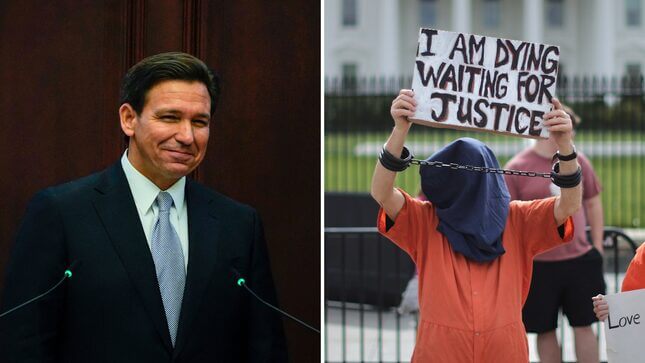Ron DeSantis Knew All About the Torture Program When He Worked at Guantánamo
As he gears up to run for president, new investigations report that DeSantis witnessed horrific conditions—though he later praised the facility.
Politics

Florida Gov. Ron DeSantis (R) served in the Navy as a lawyer, not as a pilot, as he’d like you to think. And as he appears to be gearing up for a presidential run, his record as a Navy lawyer is coming under increased scrutiny—particularly the time he spent in Guantánamo Bay, the Cuban naval base that the U.S. government used to detain and torture suspected terrorists after 9/11.
None of these detainees were charged with any crimes before they were thrown in Gitmo and held (and tortured) for years, many for well over a decade. New stories from McClatchy and The Baffler, plus an interview with a former detainee in Harper’s, detail that DeSantis worked at the facility at a time when prisoners were staging hunger strikes to protest their indefinite detention—one of their few protest tools—and the military was tying them to chairs to force-feed them using tubes through the nose. The U.N. Human Rights Commission called the practice torture. Three detainees died by suicide in June 2006 after they’d been force-fed following a hunger strike, officials said.
DeSantis was stationed there around that time, serving as a trial counsel (aka prosecutor) in the Office of the Staff Judge Advocate at Guantánamo for at least six months between March 2006 and January 2007, a Florida news outlet revealed in 2018. (The Florida governor had acknowledged his time at Gitmo during his first gubernatorial campaign, but did not say exactly what his role was.)
-

-

-

-

-

-

-

-

-

-

-

-

-

-

-

-

-

-

-

-

-

-

-

-

-

-

-

-

-

-

-

-

-

-

-

-

-

-

-

-








































